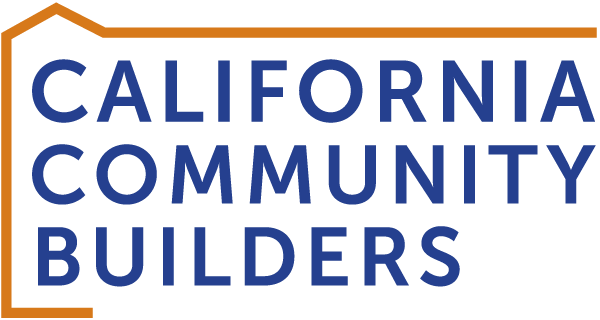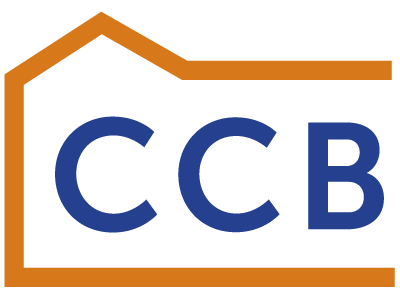“Inequality can be addressed through policy change and by addressing issues from an equity lens.”
Trina Villanueva, Sr. CRA & Community Affairs Officer, Silicon Valley Bank
Adam Briones, CEO, California Community Builders
Esther Li-Chen, Research and Communications Intern, California Community Builders
[Adam Briones] Trina, thanks so much for joining us today! First question, can you tell us about where you're from, where you’re based and a little bit about your career path?
[Trina Villanueva] Thanks for having me! I was born in the Philippines and lived there until I was 12, then my family moved to Orange County. I eventually decided to go to UC Berkeley and except for the two years I spent at the University of Michigan for graduate school, I have lived in the Bay Area since college.
As I was graduating from Michigan’s Public Policy School, I reached out to Greenlining’s founder and then executive director [and CCB founder], John Gamboa, to see if there were any opportunities. I worked for Greenlining as a Summer Associate the prior summer (the first Summer Associate cohort) and wanted to come back. It was great timing as he said, “we just received funding to work on an issue called brownfields. Why don't you come and figure it out for us?”
This was a great opportunity for me as I didn’t have a lot of work experience because I went directly from undergrad to the public policy program. The Greenlining Fellowship allowed me to work for a policy & advocacy organization focused on low-income communities of color while learning other skills like project management, fundraising and coalition building. This experience really helped build my confidence.
[Esther Li-Chen] And what’s been the common thread in your career, after that fellowship?
In my career, I've been fortunate to have worked in the nonprofit, public, and private sectors and the common thread throughout all of that has been community economic development. After the Greenlining Fellowship, I worked for other nonprofits including PolicyLink and then from there I went to the Mayor's Office of Community Development in San Francisco. I was able to take what I learned from my previous jobs and apply it as a Corporate Social Responsibility Officer at Union Bank for 11 years. Currently, I am a Sr. CRA & Community Affairs Officer at Silicon Valley Bank, which is now a division of First Citizens Bank.
[Adam] What would you say is the biggest thing you’ve learned since being in grantmaking?
I have had different types of grantmaking experience: first, in the public sector, administering Community Development Block Grants (CDBG) and second, in corporate philanthropy, specifically in banking which is guided by the Community Reinvestment Act (CRA). Grantmaking through the Mayor’s Office was a very transparent process. The public could request our reviews and notes and they were allowed to voice their opinions about our decisions at public hearings. I learned to write my reviews as detailed as I could and referenced how a program met CDBG goals.
When I started at Union Bank, it was completely different, and I had to learn their language. If I wanted to support an organization, I presented it in a way that was familiar to my colleagues who were bankers. For example, up until recently, I didn’t use the word “equity” when explaining an organization’s work. I’m surrounded by bankers who think of “equity” differently. Similarly, I explained to our nonprofit partners the bank’s priorities and asked them to show how their work aligned with those priorities.
[Esther] Since you came to the States, grew up in Orange County, which was/is more of a conservative place, what was that like for you?
Talk about culture shock. My family moved to South Orange County in the mid-80s so my brother and I really stuck out. We were two of a handful of brown kids in this small Catholic school. We moved to that part of California because our closest relatives lived there. It was definitely a big learning experience to fit in, and there were many times I felt like I didn't.
My parents still live in the same house, so I’ve seen how the neighborhood has changed. For example, the church that we still go to now has a Filipino priest and choir. Back then, it felt like we were the only Filipinos in that church and now they’re singing in Tagalog! That still blows my mind.
[Adam] What moves you to do the work you've done? What’s the change you want to see in the world?
Wow, that’s a loaded question. At Berkeley, I thought I would finish my International Development degree and then figure out a way to go back to the Philippines to work there. That was my original plan but when I went to graduate school, I realized there's more than enough to do here in the US, especially in economic development.
My experiences at Greenlining and PolicyLink showed me that income inequality can be addressed through policy change and by addressing issues from an equity lens. Even though I work in philanthropy now, I don’t do this type of work because it’s charitable. I think through philanthropy, I can support organizations who are addressing the most difficult issues and who are trying new innovative ways to invest in people and communities. In addition, I can also provide a perspective on how the bank can help build wealth and stability for families through lending and access to capital.
It hurts to see so many people struggling. Wealth inequality here in the Bay Area is so vast, I can’t just stand by and not do anything to help.
[Esther] Is there anyone that inspires you in the work that you do? Any important mentors?
Oh, there are so many. I’m inspired by many friends and colleagues who do amazing work every day. It’s hard to point to just one person.
In terms of mentors, I have been blessed to have many as well. I think the first one is John Gamboa, I learned so much from him. From conducting meetings and engaging partners to renting cars and eating well, John took the time to teach me how to do a lot of things. More importantly, he taught me that I “belonged in the room” regardless of who we were speaking to. He also took the time to learn more about me. Another mentor is James Head, the former CEO of the East Bay Community Foundation. Whenever I got into difficult situations, he was always willing to talk to me about it and provide different perspectives. Another former manager, Lisa Pagan was a mentor to me as well. I was working for her at the Office of Economic and Workforce Development in SF when I became a new mom. She knew I was struggling, and she helped guide me as I was juggling work and motherhood. I’m so thankful for that.
There are more people who I can name who have helped me with different things in my life.
[Esther] What advice would you give to other women of color in the same career as you? What would be the lessons that you would like to pass on to them?
Get to know other women in your field and build a core group of friends who you can rely on for both personal and professional support.
When I started working at Union Bank, I met other women of color who were in similar positions as me at other financial institutions. We would see each other at events and meetings and slowly got to know each other. Now, over a decade later, many of these amazing women have moved up in their careers. It feels good to be able to pick up the phone and ask their advice and they check in on me as well.
Also, you should try to pick up all the skills you can at every stage of your career. What’s helped me in my career is to take whatever I learned from each job so I can bring that to the next one.
Lastly, be yourself. In your career, try to be at workplaces that value you and what you bring to the team and where you can be yourself.
[Adam] What advice would you give to nonprofits, especially when it comes to asking for money? I’m asking for a friend…
Building a relationship with a funder is important. Don’t expect to be funded after one meeting. There were many times I would meet with organizations, and I could see their disappointment when I was not able to support them immediately or provided a very small grant. Keep at it and show the funder what you have been able to do. Invite them to events, send them information about your work and let them know what you are doing. Make sure your work still aligns with their priorities as well.
Be clear why you exist. How are you different from other organizations addressing the same issues? Can you clearly articulate your outcomes? Can you clearly show your plans to achieve your goals? I think this is a conversation I had with you, Adam. I asked you, “What’s the value that CCB is bringing to the table that another organization hasn’t already?”
Fundraising is also about communication. Some like to show infographics about their impact, and some are good at story telling. Think about what a foundation would like to know versus what an individual donor might like.
[Esther] To wrap up, Trina, how did you get so cool?
Ha! I think my kids would disagree with you for sure. They make fun of me because I don’t know how to use technology, or don’t know what they are talking about sometimes, so I’m not exactly sure how to answer this question.
I think I have just learned to be comfortable with who I am. When I came to this country, there were many things that scared me and I was unsure of myself in many ways. Over time, I have just tried to do right by my family, my friends and my community. Plus, I'm surrounded by really awesome people like my husband and have great friends who have had a positive influence on me. Being around people who are fun, upbeat and create a good space, I feel like it’s easier to have a more positive outlook.
Not All Heroes Wear Capes:
CCB’s Interview with Trina Villanueva
Adam Briones and Esther Li-Chen interview Trina Villanueva about non-profit work, philanthropy, and belonging as a Filipina American woman
We all have those people in our lives who do good work, consistently help people, and never ask for credit or recognition. CCB can’t correct the record for everyone who deserves it, but this month we wanted to publish a short interview with friend-of-the-org Trina Villanueva. She’s one of the kindest people we know and someone who has supported community organizations through her work in the public, nonprofit, and banking sectors. It’s a great read, and if you’re in the nonprofit sector and trying to raise money, be sure to check out her three fundraising tips at the end!




